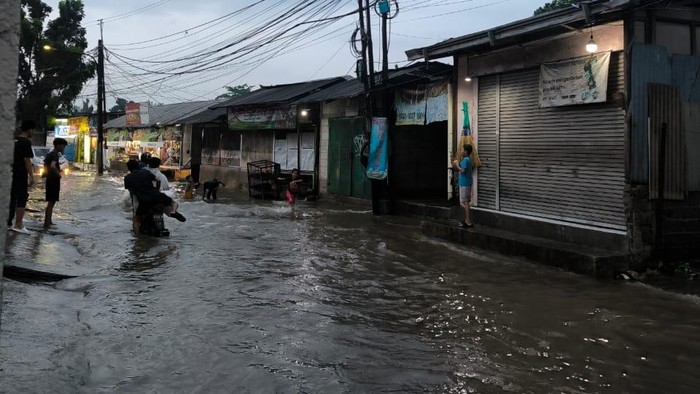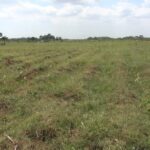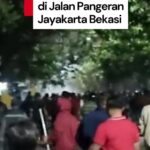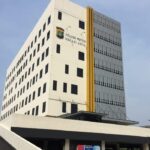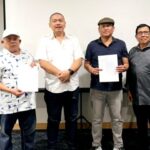Bekasi –
The Bekasi City Disaster Management Agency (BPBD) reported that five residential areas were flooded tonight, with water levels reaching up to 1 meter.
“Today, heavy localized rain accompanied by strong winds occurred in the Pondok Gede district, causing inundation between 30-100 cm in several flood-prone residential areas due to their lower elevation,” said the Head of the Bekasi City Disaster Management Agency.
The five affected residential areas are Jatibening Baru, Jatibening Permai, Bumi Nasio Indah, TNI AL Jati Kramat Complex, and IKIP Lecturer Housing. However, the exact flood height in each area was not specified.
“BPBD teams and related agencies are already on-site to assist affected residents who require help,” he added.
The heavy rain and strong winds in the area also caused fallen trees and damaged building roofs.
Flood Disaster Emergency Alert Status
Currently, the Bekasi City Government has declared an emergency alert status for floods, extreme weather, and landslides. This alert status remains in effect until the end of August.
The announcement was also posted on the official BPBD Bekasi City account. The emergency status is based on the Bekasi Mayor’s Decree No. 400.9.10/Kep.448-BPBD/VII/2025.
“The Bekasi City Government has declared an Emergency Alert Status for Floods, Extreme Weather, and Landslides, effective from July 25 to August 31, 2025,” stated the BPBD Bekasi City post.
Jatiwarna
Jatiwarna is a subdistrict in Bekasi, West Java, Indonesia, known for its vibrant textile industry, particularly batik production. Historically, it has been a center for traditional Javanese batik since the mid-20th century, blending local craftsmanship with modern influences. Today, Jatiwarna remains a cultural hub where artisans preserve batik-making techniques while adapting to contemporary designs.
Pondok Melati
Pondok Melati is a district located in Bekasi, West Java, Indonesia, known for its urban development and accessibility to Jakarta. Historically, it was part of Bekasi’s expansion as a residential and industrial area, growing rapidly in the late 20th century. The name “Pondok Melati” (which means “Jasmine Hut” in Indonesian) reflects its transition from a more rural past to a bustling suburban region.
Bekasi
Bekasi is a city located in West Java, Indonesia, known for its rapid urbanization and industrial growth. Historically, it was part of the ancient Tarumanagara Kingdom (4th–7th century) and later became an important agricultural and trade area during the Dutch colonial period. Today, Bekasi is a bustling satellite city of Jakarta, blending modern development with cultural heritage.
Jatibening Baru
Jatibening Baru is a residential area located in Bekasi, West Java, Indonesia, known for its urban development and community growth. Historically, it was part of the larger Jatibening region, which transformed from rural land into a suburban neighborhood to accommodate Jakarta’s expanding population. Today, it serves as a bustling residential and commercial hub for locals and commuters.
Jatibening Permai
Jatibening Permai is a residential area located in Bekasi, West Java, Indonesia, known for its well-planned community and urban development. Originally developed in the late 20th century, it has grown into a bustling suburban neighborhood with a mix of housing, commercial areas, and local amenities. While not a historical or cultural landmark, it reflects the rapid urbanization and modernization of the Greater Jakarta region.
Bumi Nasio Indah
Bumi Nasio Indah is a cultural site in Sabah, Malaysia, showcasing the heritage of the indigenous Dusun people. It features traditional longhouses, handicrafts, and cultural performances, offering visitors insight into the community’s way of life. The site was established to preserve and promote Dusun traditions amid modernization.
TNI AL Jati Kramat Complex
The **TNI AL Jati Kramat Complex** is a military facility associated with the Indonesian Navy (TNI AL). It serves as a training, administrative, or residential site for naval personnel, reflecting Indonesia’s maritime defense infrastructure. While detailed historical records are limited, such complexes are typically established to support military operations and personnel welfare.
IKIP Lecturer Housing
The **IKIP Lecturer Housing** refers to residential complexes built to accommodate lecturers from IKIP (Institut Keguruan dan Ilmu Pendidikan), Indonesia’s former teacher training institutes, now often transformed into universities (e.g., Universitas Negeri). These housing units were typically established during the mid-to-late 20th century to support educators and promote academic development. Today, some remain in use while others have been repurposed or redeveloped as Indonesia’s higher education system evolved.

